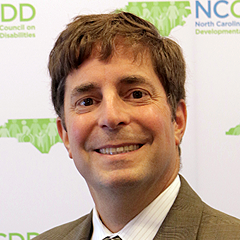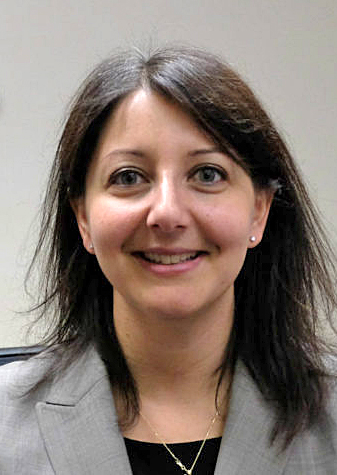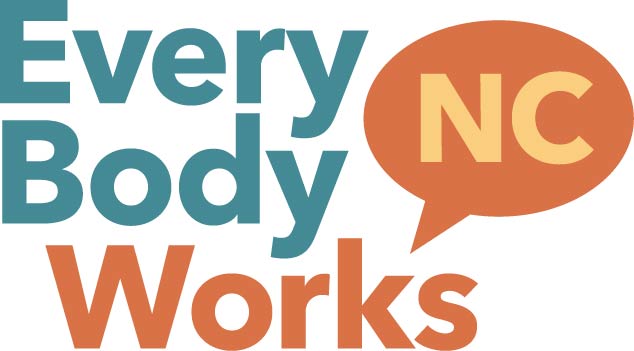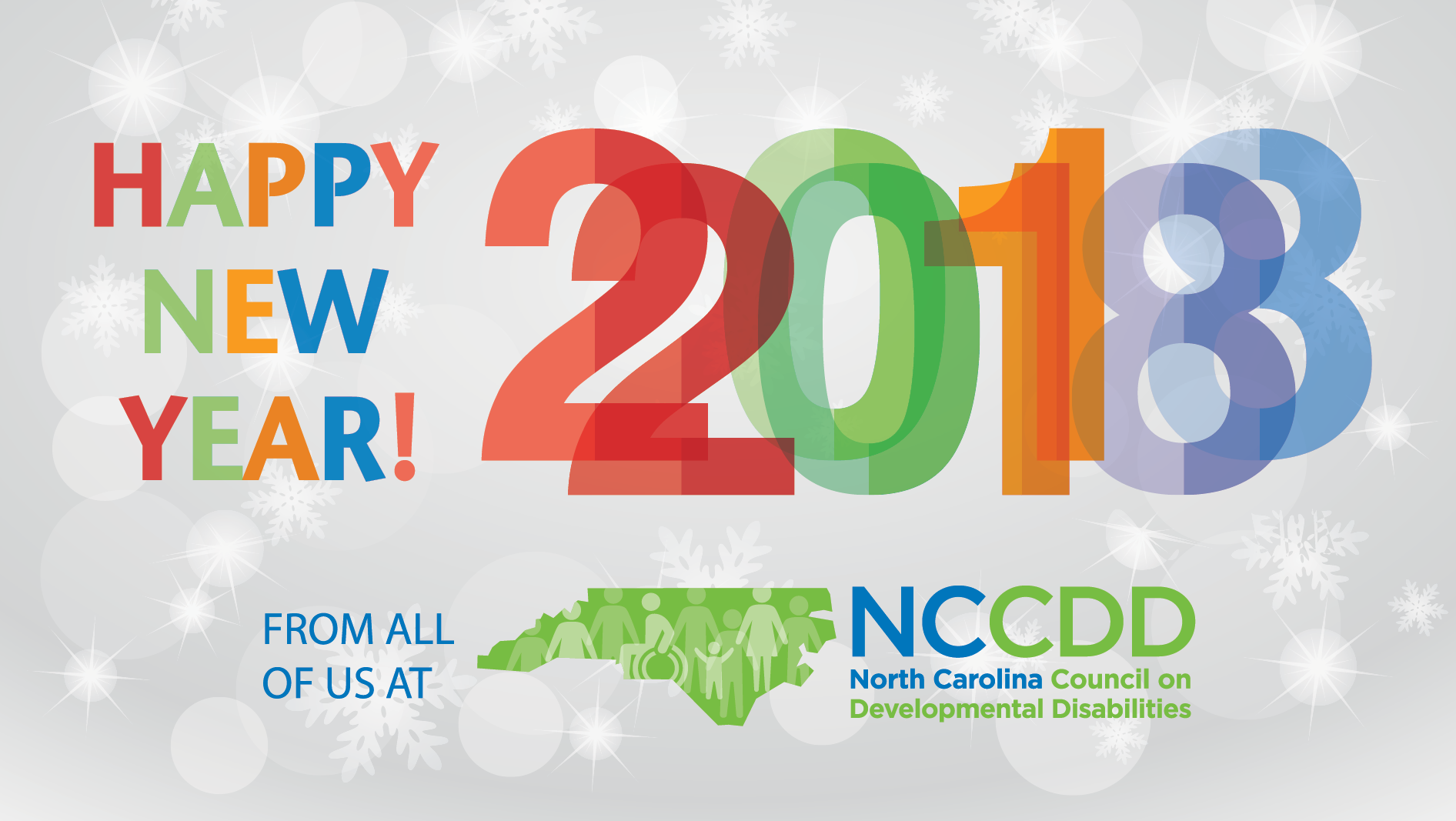January 2018: Highlights and Hot Topics

- Upward to Financial Stability Hosts Seminars
-
#EveryBodyWorksNC - Secretary Cohen Speaks to Outer Banks Chamber of Commerce
- Read the Newsletter Online
A Message from Our Executive Director
 Happy New Year! As 2018 gets underway, we are reminded of the new opportunities and possibilities that are ahead of us. We have entered year number two of our Five-Year Plan, and the members and staff of the North Carolina Council on Developmental Disabilities (NCCDD) are just as excited as we were last year at this time, when we began implementing the new plan.
Happy New Year! As 2018 gets underway, we are reminded of the new opportunities and possibilities that are ahead of us. We have entered year number two of our Five-Year Plan, and the members and staff of the North Carolina Council on Developmental Disabilities (NCCDD) are just as excited as we were last year at this time, when we began implementing the new plan.
The new year gives us the opportunity to continue working on important initiatives that have been underway (you can review a summary of these efforts in our annual report here). In addition, as we enter into 2018 we are already in the planning stages for important priorities that require action, and the Council will be considering new Requests for Applications (RFAs) during the February Council meeting in each of our three major goal areas of asset development, community living and advocacy development. Keep a close eye on our website and social media for these new requests for applications. As a reminder, if you have not already done so, please add your name to our mailing list to get the most updated information here.
Another exciting event, as we begin the new year, includes NC Department of Health and Human Services Secretary, Mandy Cohen. We are very excited that Secretary Cohen will be giving the keynote address at the Health and Human Services Community Forum on February 1st, in Kill Devil Hills, NC. Secretary Cohen will highlight the Council’s initiative, EveryBody Works NC, a collaboration between NC Vocational Rehabilitation (NCVR), the NC Business Leadership Network (NCBLN) and NC Works. The focus of the campaign, which kicked off during National Disability Employment Awareness Month in October, is aimed at raising awareness about the hiring gap between people with disabilities and people without disabilities, the opportunities that exist to improve employment outcomes for these individuals, and the benefits for the business community. This forum is co-sponsored by NCCDD and the Outer Banks Chamber of Commerce (read more here).
We look forward to 2018 and our collaboration with each of you in the important work ahead!
Chris Egan
Executive Director
![]() Federal Policy
Federal Policy
Tax Policy
On December 20, 2017 the House and Senate passed the Tax Cuts and Jobs Act, which was signed by President Trump two days later. The bill provides temporary tax cuts for individuals and families and permanent tax cuts for many businesses and corporations. While these changes will impact each tax return differently, on a macro level, this law will have a significant impact. It increases the deficit by $1.5 trillion and repeals the individual mandate of the Affordable Care Act, which will increase the uninsured population by approximately 13 million people. Leaders in the House and Senate have articulated a need to cut spending to offset the significant uptick in the deficit created by the Tax Cuts and Jobs Act.
Continuing Resolution
On January 22, 2018, after a 3-day government shutdown, the House and Senate passed a bill which funds the government through February 8, 2018. The continuing resolution passed by both chambers includes funding the Children’s Health Insurance Program (CHIP) for six years. The inclusion of CHIP cannot be overstated -- as many as 20 states were at risk of insufficient funding as early as February 1, 2018.
The RAISE Family Caregiving Act
In early January, the Senate passed the Recognize, Assist, Include, Support, and Engage Family Caregivers Act of 2017, or RAISE Family Caregivers Act (H.R. 3579). The bipartisan legislation instructs the Secretary of Health and Human Services to create a cross-sector advisory committee to develop recommendations at local, state and federal levels to best recognize and support caregivers. This article outlines some of the main goals, including person and family-centered care, training and respite for family caregivers, successful workplace policies that keep families working, and dissemination of promising caregiving models among others.
2018 Changes to the ABLE Act
ABLE account holders will see changes that could positively impact them in 2018. Annual contribution limits have increased to $15,000. Funds can be rolled over from a 529 education plan to an ABLE account without penalty (provided both accounts are in the same name), and ABLE account holders who work may be eligible to put aside additional funds above the $15,000 limit among others. Register for a webinar on Thursday, January 25 to learn more about these changes. (This link is no longer active.)
State Policy
Redistricting:
Congressional Districts
On August 5, 2016, Common Cause filed suit in the US District Court for the Middle District of NC arguing the newly approved congressional district plan constituted an illegal partisan gerrymander. On August 22, 2016, the League of Women Voters of North Carolina filed a similar suit in the same court. The two cases were consolidated. On January 9, 2018, a three-judge panel of the United States District Court for the Middle District of North Carolina ruled the state's congressional district map demonstrated unconstitutional partisan gerrymandering. The NC General Assembly was given until January 24, 2018 to approve new district lines. On January 18, 2018, the US Supreme Court stayed the district court's January 9 order, preventing it from going into effect while the state files its appeal. This means the districts drawn in February 2016 stand for now. The ruling gives some continuity to the election cycle. But the issue is not settled as there is still an order to redraw the districts.
Legislative Districts
There was a similar suit around legislative districts. In August 2016, the US District Court for the Middle District of NC ruled that North Carolina's state legislative district map constituted an illegal racial gerrymander. The General Assembly was ordered to draw new maps which were not accepted by the courts, so a special master was appointed. The final recommendations were issued in December 2017. The district court panel overseeing the case issued an order adopting the special master’s recommendations on January 19, 2018. On January 21, 2018, state Republican lawmakers filed a motion requesting that the court stay its order pending an appeal to the Supreme Court of the United States. At this point, we do not have resolution in the legislative redistricting, less than 10 months from the election.
General Assembly
The North Carolina Legislature is in session this week. But there are no votes scheduled this week. Next week, we expect see bills and votes to occur. In order for the NC Department and Health and Human Services to proceed with the proposed Medicaid transformation, legislative action is needed.
Committee on Intellectual and Developmental Disabilities (I/DD) – This committee was the result of legislative action during this session. It is scheduled to meet on February 6, 2018. It is chaired by Senator Mike V. Lee (R-9) and Representative John R. Bradford (R-98).
- The charge for the committee is to examine the following and report back to the General Assembly:
- The current resources and programs available in North Carolina to transition those with I/DD into integrated, paid, competitive employment;
- Review what services and supports are necessary to provide transition from education to employment for those with I/DD;
- Review what programs the state should support and invest in to allow more individuals with I/DD to become employed, including programs within state and local governments to employ those with I/DD;
- Review what role the North Carolina Education System can play in the transition from education to employment for those with I/DD;
- Review county-level coordination between programs and agencies serving individuals with I/DD and how to increase awareness of available services to local governments and target populations; and
- Care solutions and opportunities for those with I/DD that are not capable of fully transitioning into a work environment.
NCCDD Upward to Financial Stability Hosts Seminars
![]() NCCDD's Upward to Financial Stability Initiative (Goal 1) is hosting a four-part webinar series during the month of February on breaking down barriers to employment for people with disabilities. The series will cover information about Social Security Administration and Supplemental Security Income benefits, work supports, Medicaid options, and more. The webinars will be held on February 6th, 13th, 20th, and 27th at 1 PM. Registration is required for each of the four parts. Read below for more information and follow the registration link for each session.
NCCDD's Upward to Financial Stability Initiative (Goal 1) is hosting a four-part webinar series during the month of February on breaking down barriers to employment for people with disabilities. The series will cover information about Social Security Administration and Supplemental Security Income benefits, work supports, Medicaid options, and more. The webinars will be held on February 6th, 13th, 20th, and 27th at 1 PM. Registration is required for each of the four parts. Read below for more information and follow the registration link for each session.
Breaking Down Barriers to Employment:
Accessing Accurate Information about SSA Benefits
February 6, 2018 • 1:00 PM ET
Join National Disability Institute as we provide an overview of the disability programs administered by the Social Security Administration (SSA) and how working is a choice, which can lead to financial stability for persons with disabilities. Gain knowledge to replace myths with facts about cash benefits, Medicare and Medicaid. Learn the importance of benefit planning and the use of work supports that can increase earnings and savings that leads to financial stability. Register at http://bit.ly/2rAhFWh. (This link is no longer active.)
Breaking Down Barriers to Employment:
Understanding Supplemental Security Income Work Incentives
February 13, 2018 • 1:00 PM ET
Join National Disability Institute as we provide an overview of Supplemental Security Income (SSI) based on disability with a focus on work incentives. This webinar will provide information on the differences between SSI for children and SSI for adults, and the relevance of income, assets, resources and Medicaid when beneficiaries work. The presentation will explore a variety of SSI work supports, Medicaid options and how they can help people work to their fullest capabilities and maximize their earnings and savings, which can lead to financial stability. Register at http://bit.ly/2n5wXgS. (This link is no longer active.)
Breaking Down Barriers to Employment:
Understanding Social Security Disability Insurance Work Incentives
February 20, 2018 • 1:00 PM ET
Join National Disability Institute as we provide an overview of the Social Security Disability Insurance (SSDI) program and how working and using work incentives can result in financial stability through increased retirement income and/or savings for people who have disabilities. Discover the variety of ways you can keep Medicare coverage and qualify for the Medicaid Buy-In while working. Register at http://bit.ly/2Dt0yqD. (This link is no longer active.)
Breaking Down Barriers to Employment:
Complex Issues, Other Public Benefits and Resources
February 27, 2018 • 1:00 PM ET
Join National Disability Institute as we provide information for individuals who receive more than one type of disability benefit, individuals who choose self-employment as an option, individuals who receive other public benefits and other complex issues. This webinar will provide an overview of resources, including additional Social Security Administration resources that individuals can access. Register at http://bit.ly/2F9eaIj. (This link is no longer active.)
Council Member Spotlight - Will Miller

Will Miller is one very busy man. He has a solo law practice in Lexington, NC, incorporated as Attorney William T. Miller, PLLC, focusing primarily on estate planning and administration. He also serves as an Attorney Advocate for the District 22B Guardian ad Litem program and as court-appointed attorney for indigent criminal clients in District Court.
Miller willingly accepted Governor Roy Cooper’s appointment to the North Carolina Council on Developmental Disabilities (NCCDD) in July 2017. “I have personal experience with the barriers that a disability can create, have reaped the benefits of the work of other advocates, and therefore feel a sense of duty to help others with disabilities to reach their full potential,” said Miller, who is visually impaired.
“The Council was a strong partner of the North Carolina Statewide Independent Living Council while I was Executive Director of that organization. I decided to get involved because of the statewide impact of the Council and the opportunity to contribute to the efforts of a first-class, disability advocacy organization,” Miller explains.
A Lexington, NC resident, Miller says his biggest advocacy challenge has been in coordinating the efforts of service providers and disability advocacy organizations. He adds the best thing the Council is doing is identifying and funding local, grassroots organizations throughout North Carolina to enhance the lives of individuals with intellectual and other developmental disabilities (I/DD) and their families.
“Cookie-cutter solutions are rarely effective in solving the unique circumstances in North Carolina's 100 counties, and local organizations are in the best position to understand the specific needs of their home communities,” Miller says. Miller also hopes the Council will focus on maximizing the potential of individuals with I/DD to be independent and productive members of the communities where they choose to live.
Miller received his Bachelor’s degree in English from the University of North Carolina – Chapel Hill and his law degree from Wake Forest University School of Law. He is a member of the North Carolina Bar Association, the District 22B Bar and just completed a three-year term on the board of directors of the Triangle Radio Reading Service in Raleigh.
In what spare time Miller has, he enjoys spending time with friends and family, long walks with his seeing-eye dog Anja, listening to podcasts, and following college sports.
He is driven in his work and advocacy by the motto “Make the most of today, because there is no guarantee of tomorrow.”
#EveryBodyWorksNC – NC DHHS Secretary Mandy Cohen to Speak to Outer Banks Chamber of Commerce DHHS Secretary Mandy Cohen
DHHS Secretary Mandy Cohen
NC Department of Health and Human Services Secretary Mandy Cohen will keynote the Health and Human Services Community Forum at the Outer Banks Chamber of Commerce on February 1, 2018 at Captain George’s Seafood Restaurant in Kill Devil Hills, NC.
Secretary Cohen will introduce the EveryBody Works NC campaign to the local business and disability communities in an effort to close the 45-point unemployment gap between working-aged people with disabilities and those without disabilities as part of a health and human services community forum organized by local advocates.
Local businesses, professionals and disability advocates are encouraged to attend, and the event is free. Please RSVP at http://bit.ly/2FJV2l8.
The event is sponsored by the Outer Banks Chamber of Commerce and NCCDD.
Get involved with EveryBody Works NC at https://nccdd.org/everybody-works-nc/about-everybody-works-nc.html
 About EveryBody Works NC:
About EveryBody Works NC:
The Everybody Works NC campaign is increasing awareness of the untapped pool of talent found in the disability community and creating more and more job opportunities for people with disabilities. October was National Disability Employment Awareness Month (NDEAM), which kicked off the year-long EveryBody Works NC campaign with a statewide speaking tour, media relations programs, social media and a series of special events. The campaign is led by the North Carolina Council on Developmental Disabilities (NCCDD), the North Carolina Business Leadership Network (NCBLN) and the North Carolina Vocational Rehabilitation (NCVR) to promote and support inclusive workforce strategies.
